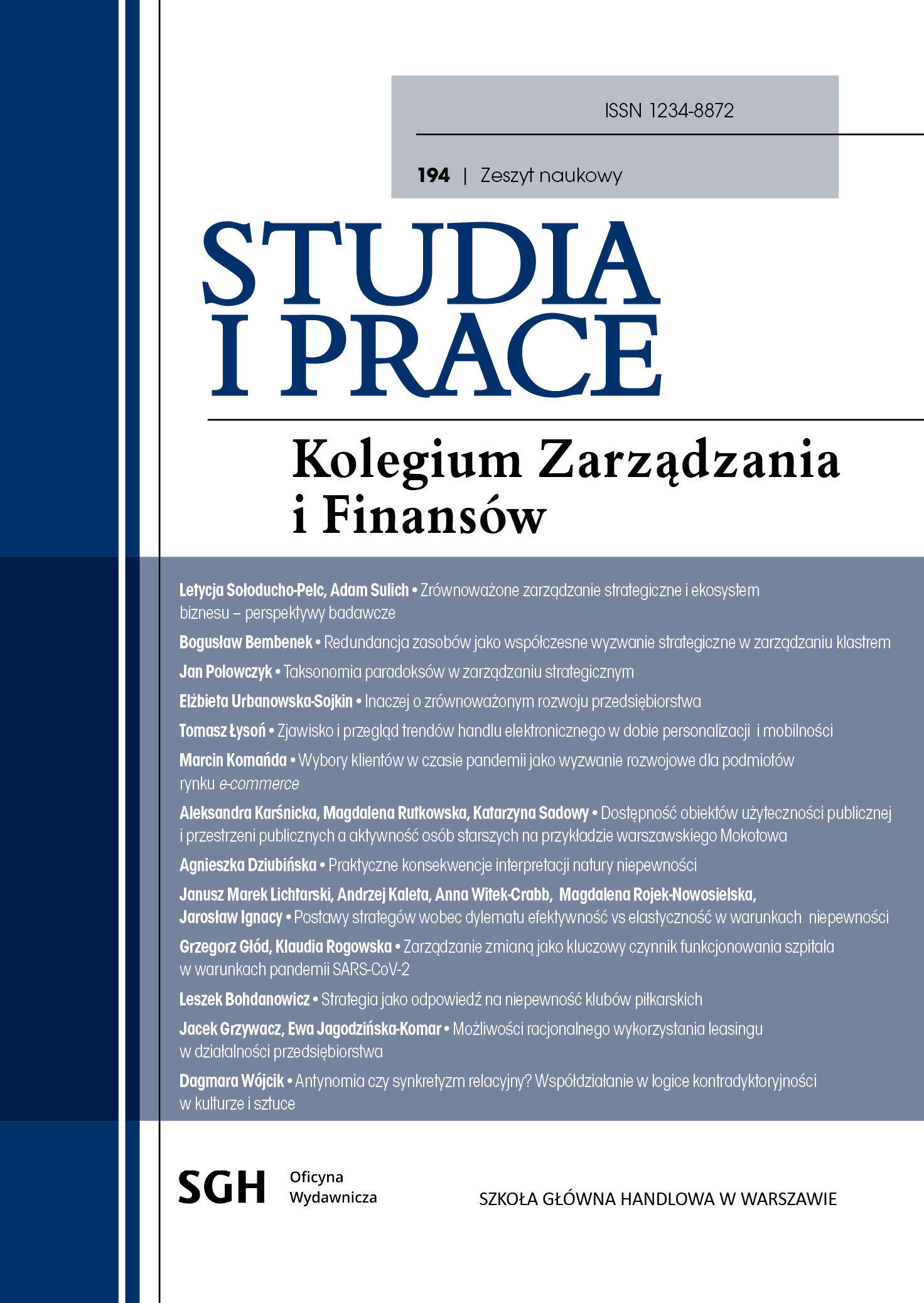Strategists’ attitudes towards the efficiency vs flexibility dilemma in the context of uncertainty
DOI:
https://doi.org/10.33119/SIP.2023.194.9Keywords:
dilemmas, environmental uncertainty, strategic managementAbstract
The aim of the study was to identify strategists’ attitudes towards the efficiency vs flexibility dilemma under uncertainty. The research was conducted in a qualitative approach using in-depth interviews with strategists (n = 18). The findings reveal that, in the face of uncertainty, various strategic attitudes emerge. In addition to strategies focused on optimisation (efficiency) or resource reserves (flexibility), defensive and offensive attitudes were revealed, thereby constituting a matrix of responses to the examined dilemma.
Downloads
References
Wydawnictwa zwarte
Creswell, J. (2014). Research Design: Qualitative, Quantitative, and Mixed Methods Approaches. Thousand Oaks: Sage.
Eriksson, P., Kovalainen, A. (2016). Qualitative Methods in Business Research (2nd ed.). Los Angeles: Sage.
Gerring, J. (2007). Case Study Research. Principles and Practices. New York: Cambridge University Press.
Knight, F. H. (1921). Risk, Uncertainty and Profit. Boston–New York: Houghton Mifflin Company.
Krupski, R. (red.). (2005). Zarządzanie przedsiębiorstwem w turbulentnym otoczeniu. Ku superelastycznej organizacji. Warszawa: PWE.
Schomberg, von R. (1993). Controversies and Political Decision Making. Dordrecht: Kluwer Academic Publishers.
Wit, de B., Meyer, R. (2007). Synteza strategii. Tworzenie przewagi konkurencyjnej poprzez analizowanie paradoksów. Warszawa: PWE.
Artykuły naukowe
Adler, P. S., Goldoftas, B., Levine, D. (1999). Flexibility versus Efficiency? A Case Study of Model Changeovers in the Toyota Production System, Organization Science, 10, s. 43–68.
Combe, I. A., Rudd, J. M., Leeflang, P. S. H., Greenley, G. E. (2012). Antecedents to Strategic Flexibility, European Journal of Marketing, 46 (10), s. 1320–1339.
Das, T. K., Elango, B. (1995). Managing Strategic Flexibility: Key to Effective Performance, Journal of General Management, 20 (3), s. 60–74.
Duncan, R. B. (1972). Characteristics of Organizational Environments and Perceived Environmental Uncertainty, Administrative Science Quarterly, 17, s. 313–327.
Eisenhardt, K. M., Martin, J. A. (2000). Dynamic Capabilities: What Are They?, Strategic Management Journal, 21 (10/11), s. 1105–1121.
Giones, F., Brem, A., Berger, A. (2019). Strategic Decisions in Turbulent Times: Lessons from the Energy Industry, Business Horizons, 62, s. 215–225.
Grewal, R., Tansuhaj, P. (2001). Building Organizational Capabilities for Managing Economic Crisis: The Role of Market Orientation and Strategic Flexibility, Journal of Marketing, 65 (2), s. 67–80.
Hitt, M. A., Ireland, R. D., Sirmon, D. G., Trahms, C. A. (2011). Strategic Entrepreneurship: Creating Value for Individuals, Organizations, and Society, Academy of Management Perspectives, 25 (2), s. 57–75.
Jauch, L. R., Kraft, K. L. (1986). Strategic Management of Uncertainty, Academy of Management Review, 11, s. 777–790.
Karhu, P., Ritala, P. (2020). The Multiple Faces of Tension: Dualities in Decision-Making, Review of Managerial Science, 14 (3), s. 485–518.
Krupski, R. (2004). Redefiniowanie strategii organizacji, Prace Naukowe Akademii Ekonomicznej we Wrocławiu, 1045, s. 82–83.
Lewis, R., Sutton, N., Brown, D. (2023). How Senior Managers Use Interactive Control to Manage Strategic Uncertainties: An Attention-Based View, Management Accounting Research, July.
Magnani, G., Zucchella, A. (2019). Coping with Uncertainty in the Internationalisation Strategy. An Exploratory Study on Entrepreneurial Firms, International Marketing Review, 36 (1), s. 131–163.
Mahnke, V., Venzin, M., Zahra, S. (2007). Governing Entrepreneurial Opportunity Recognition in MNEs: Aligning Interests and Cognition under Uncertainty, Journal of Management Studies, 44, s. 1278–1298.
Nadkarni, S., Narayanan, V. K. (2007). Strategic Schemas, Strategic Flexibility, and Firm Performance: The Moderating Role of Industry Clockspeed, Strategic Management Journal, 28 (3), s. 243–270.
Sanchez, R. (1995). Strategic Flexibility in Product Competition, Strategic Management Journal, 16, s. 135–159.
Sawyerr, O., Ebrahimi, B. (2022). Executive Environmental Scanning and Strategic Uncertainty: The Impact of Institutional Context, International Studies of Management and Organization, 52 (1), s. 7–24.
Schad, J., Lewis, M. W., Raisch, S., Smith, W. K. (2016). Paradox Research in Management Science: Looking Back to Move Forward, Academy of Management Annals, 10 (1), s. 5–64.
Smith, W. K., Lewis, M. W. (2011). Toward a Theory of Paradox: A Dynamic Equilibrium Model of Organizing, Academy of Management Review, 36 (2), s. 381–403.
Smith, W. K., Lewis, M. W., Tushman, M. L. (2016). A “Both/And” Approach to Leadership: Exploit and Explore, Harvard Business Review, 94 (5), s. 62–70.
Tabesh, P., Vera, D. M. (2020). Top Managers’ Improvisational Decision-Making in Crisis: A Paradox Perspective, Management Decision, 58 (10), s. 2235–2256.
Urbanowska-Sojkin, E. (2010). Wybory strategiczne przedsiębiorstw w teorii, Zeszyty Naukowe Uniwersytetu Ekonomicznego w Poznaniu, 134, s. 9–27.
Urbanowska-Sojkin, E. (2022). Kolonizacja ryzyka wdrażania strategii w przedsiębiorstwach, Organizacja i Kierowanie, 2, s. 67–81.
Waldman, D. A., Putnam, L. L., Miron-Spektor, E., Siegel, D. (2019). The Role of Paradox Theory in Decision Making and Management Research, Organizational Behavior and Human Decision Processes, 155, s. 1–6.
Downloads
Published
How to Cite
Issue
Section
License
Copyright (c) 2024 Studies and Work of the Collegium of Management and Finance

This work is licensed under a Creative Commons Attribution 4.0 International License.









